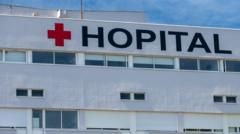This delivery is pivotal as thousands of patients await treatment for the curable disease, which can cause severe health complications if left untreated.
**Crucial Leprosy Medications Set to Arrive in Nigeria After Year-Long Shortage**

**Crucial Leprosy Medications Set to Arrive in Nigeria After Year-Long Shortage**
After a year-long delay, essential leprosy medications are finally expected to arrive in Nigeria, addressing an urgent health crisis.
Following a year-long shortage, the World Health Organization (WHO) has confirmed that vital leprosy drugs are set to arrive in Nigeria this weekend. The nation records over 2,000 new leprosy cases annually, and a combination of barriers, including new regulations, resulted in the lack of supply. The WHO had urged Nigerian authorities to momentarily lift stringent testing policies, paving the way for imports from India.
Leprosy, while curable with a regimented course of antibiotics, can lead to severe health repercussions such as sores, nerve damage, and disfigurement when left untreated. The duration of treatment ranges from six to twelve months. However, with patients unable to access medications, many have been discharged from hospitals, raising concerns over potential spread due to increased transmission rates.
Dr. Samimu Msheliza, a public health expert and advisor with the Leprosy Mission, voiced his concerns to BBC, stating, “We have thousands of newly diagnosed leprosy patients across various cities who are just waiting for this drug. The quicker we have [the drugs], the better. Currently, these people are suffering; their transmission is ongoing because they are not being treated.”
Reports from individuals affected by leprosy, like Awwal Musa from Nasarawa state, showcase the dire situation, as her health has deteriorated significantly without medication. "Before last year, my wounds were getting healed, but now they are getting worse. The pain is worse," she shared, highlighting the urgency of the situation.
Nigeria’s drug regulatory authority recently implemented new measures aimed at curbing the importation of counterfeit and substandard medications, complicating the availability of essential treatments. Although these regulations were intended to enhance safety, they inadvertently contributed to the existing crisis regarding leprosy medications.
Leprosy, while curable with a regimented course of antibiotics, can lead to severe health repercussions such as sores, nerve damage, and disfigurement when left untreated. The duration of treatment ranges from six to twelve months. However, with patients unable to access medications, many have been discharged from hospitals, raising concerns over potential spread due to increased transmission rates.
Dr. Samimu Msheliza, a public health expert and advisor with the Leprosy Mission, voiced his concerns to BBC, stating, “We have thousands of newly diagnosed leprosy patients across various cities who are just waiting for this drug. The quicker we have [the drugs], the better. Currently, these people are suffering; their transmission is ongoing because they are not being treated.”
Reports from individuals affected by leprosy, like Awwal Musa from Nasarawa state, showcase the dire situation, as her health has deteriorated significantly without medication. "Before last year, my wounds were getting healed, but now they are getting worse. The pain is worse," she shared, highlighting the urgency of the situation.
Nigeria’s drug regulatory authority recently implemented new measures aimed at curbing the importation of counterfeit and substandard medications, complicating the availability of essential treatments. Although these regulations were intended to enhance safety, they inadvertently contributed to the existing crisis regarding leprosy medications.




















